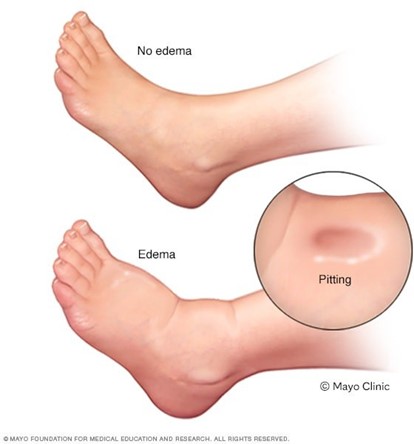A nurse is caring for a client who is receiving a blood transfusion.
The nurse observes that the client has bounding peripheral pulses, hypertension, and distended jugular veins.
The nurse should anticipate administering which of the following prescribed medications?
Diphenhydramine.
Furosemide.
Acetaminophen.
Pantoprazole.
The Correct Answer is B
“Furosemide.” The nurse should anticipate administering furosemide because the client’s symptoms of bounding peripheral pulses, hypertension, and distended jugular veins may indicate fluid overload.
Furosemide is a diuretic medication that can help reduce fluid overload by increasing urine output.
Choice A is incorrect because diphenhydramine is an antihistamine medication that is not used to treat fluid overload.
Choice C is incorrect because acetaminophen is a pain reliever and fever reducer that is not used to treat fluid overload.
Choice D is incorrect because pantoprazole is a proton pump inhibitor that is used to treat acid reflux and stomach ulcers, not fluid overload.
Nursing Test Bank
Naxlex Comprehensive Predictor Exams
Related Questions
Correct Answer is B
Explanation

A full-thickness burn injury can result in fluid loss and low blood volume (hypovolemia), which can lead to hypotension.
Choice A, Urinary diuresis, is not the correct answer because it refers to increased production of urine and is not a common symptom of a full-thickness burn injury.
Choice C, Decreased respiratory rate, is not the correct answer because it refers to a decrease in the number of breaths per minute and is not a common symptom of a full-thickness burn injury.
Choice D, Bradycardia, is not the correct answer because it refers to a slow heart rate and is not a common symptom of a full-thickness burn injury.
Correct Answer is A
Explanation

Edema, or swelling in the legs, is a common symptom of venous disease.
Hair loss distal to the client’s calves (choice B) is not a typical symptom of venous vascular disorder.
Leg pain at rest (choice C) can be a symptom of peripheral vascular disease but is not specific to venous vascular disorder.
An ulcer on the tip of a toe (choice D) can be a sign of arterial vascular disorder but is not specific to venous vascular disorder.
Whether you are a student looking to ace your exams or a practicing nurse seeking to enhance your expertise , our nursing education contents will empower you with the confidence and competence to make a difference in the lives of patients and become a respected leader in the healthcare field.
Visit Naxlex, invest in your future and unlock endless possibilities with our unparalleled nursing education contents today
Report Wrong Answer on the Current Question
Do you disagree with the answer? If yes, what is your expected answer? Explain.
Kindly be descriptive with the issue you are facing.
